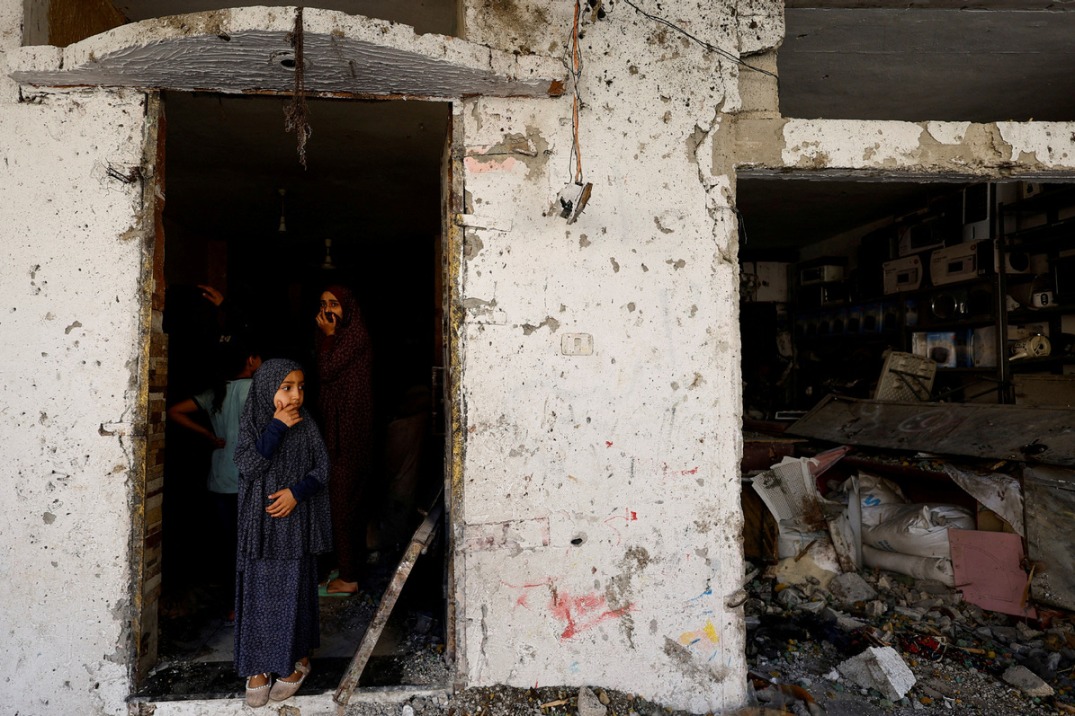China-Europe Forum on Reform and Globalization successfully held in Madrid

About 30 politicians, academics, business leaders, and other notable figures spoke at the China-Europe Forum on Reform and Globalization in Madrid on Nov 22.
The forum was hosted by China Daily, in collaboration with the China Institute for Reform and Development, and ESADEgeo-Center for Global Economy and Geopolitics. The forum partners were Beijing Automotive Group Co, Melia Hotels International, and El País.
The forum was attended by Irene Lozano, state secretary for global Spain, and José Luis Rodríguez Zapatero, former prime minister of Spain, and more than 150 representatives from the political, business, and academic fields, as well as members of the media.
The forum featured in-depth discussions across the topics of ‘China-Europe Partnership & Reform’, ‘Sino-Spanish Strategic Relations and Common Prosperity’, and ‘Economic Development and Globalization Process’.
The discussions revisited China’s reform and opening-up journey, examined growing China-EU collaboration, and China-Spain collaboration within a new era, and the continued building of an open and free global trade and economic landscape.
The forum’s opening addresses were given by Wang Xiaohui, executive deputy head of the Publicity Department of the CPC Central Committee and deputy head of the Policy Research Center of the CPC Central Committee; Javier Solana, former NATO secretary-general and former Spanish minister of foreign affairs as well as chairman of the ESADEgeo-Center for Global Economy and Geopolitics; and Lyu Fan, China’s ambassador to Spain.
Keynote speeches were given by Liu Shijin, vice-chairman of the China Development Research Foundation, deputy director of the Economic Affairs Committee of the Chinese People’s Political Consultative Conference; and Bernard Dewit, chairman of the Belgian-Chinese Chamber of Commerce.
Wang Xiaohui said: “This year marks the 45th anniversary of the establishment of diplomatic ties between China and Spain. In a few days, President Xi Jinping will make a formal visit to Spain, which will inject new momentum and the China-Spain bilateral relationship will enter a new chapter. To host the China-Europe Forum on Reform and Globalization now, and focus its discussions on the topics of China’s reform and opening-up and China-EU relations is timely and significant. China-EU relations is one of the most important bilateral relations in the world. It concerns not only the development of China and the EU, but also impacts the world’s political and economic development paradigm. China’s 40 years of reform and opening-up marks a history of the Chinese people’s hard work and devotion, and marks an important chapter of China’s development. China has witnessed incredible transformations, China has entered a new era of socialism with Chinese characteristics. China has not only demonstrated its strength, but also brought prosperity to the world, and became a significant driver of global development and a force for stability for world economic growth. It has become a lively and big market for the world and an active contributor for global governance reform.”
Wong added: “As China continues to deepen its reforms, it will create a significant driving force for a new and open world. China’s pursuit of a new round of high-level opening-up welcomes countries from Europe and around the world to seize the opportunity to develop, realize mutual prosperity and build an open global economy together. China’s proposal to build a community with a shared future for mankind has pointed the direction for future world development and been widely acknowledged. China and the EU should recognize the challenges we face together and master the logic of world development. In addition, we should uphold international rules, stick to multilateralism, deal with common challenges, and strive to be a model of cooperation through inclusiveness, mutual learning, mutual benefits and win-win cooperation. The Belt and Road Initiative has developed concrete projects and is providing broader opportunities for China-EU cooperation. Both parties should broaden cooperation channels, build new models for economic growth, cooperation, governance and development, and share the benefits of greater connectivity in Eurasia.”
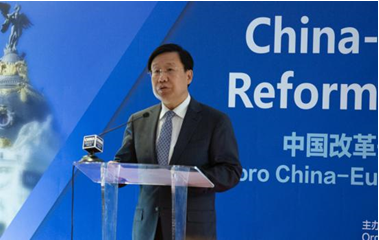
José Luis Rodríguez Zapatero, a former prime minister of Spain, said: “To say politics with capital letters today is to say multilateralism, cooperation, global responses, and in this historical moment it means strengthening international organizations. Strengthen a United Nations system. Strengthen the G20 as the most relevant forum for international economic collaboration. We need a strong commitment with the G20. We need a stronger, more stable, deeper global economic cooperation. Globalization is an irreversible process, the story of globalization cannot be stopped. The protectionist and anti-multilateralism movements are a serious mistake, they hurt, but they will not stop history. Share and respect. Respect the plurality and diversity of cultures, civilizations, identities, life systems. And if we want to see changes in political systems, let’s use persuasion and not accusation. China and the EU, as two major international actors, have the historic responsibility to ally themselves more deeply to build this global cooperation order. Let’s change the international order, let’s build a political community of nationals and peoples, solidary and cooperative.”
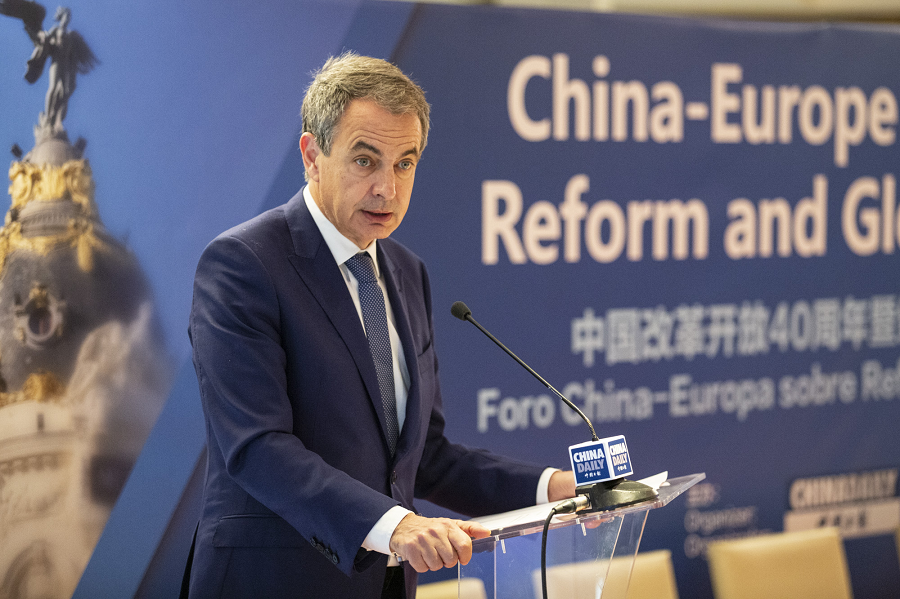
Javier Solana, former NATO secretary-general, former Spanish minister of foreign affairs, and chairman of the ESADEgeo-Center for Global Economy and Geopolitics, said: “This year marks China’s 40thanniversary of reform and opening-up and the 40th anniversary of the Spanish constitution, therefore both China and Spain stand at a historical moment. China has, through reform and opening-up, created incredible achievements, especially in its integration into the world financial system since joining the WTO in 2001, and making significant contributions to help the world recover from the 2008 financial crisis. China has contributed to the world economic growth and we need to continue cooperating with China, to ensure that the world economy continues to operate with stability. Strategic trust is the key to strategic collaboration. We want to build a mutually supportive and better world on the foundation of strengthening strategic trust.

Lyu Fan, China’s ambassador to Spain, said:“It can be said that the past 40 years have witnessed the domestic development and changes of the two countries, as well as the glorious course of the leap-forward development of China-Spain relations. Both China and Europe are guardians of multilateralism and free trade. The healthy, stable and sustainable bilateral relations between China and Spain and the promotion of bilateral and regional cooperation for mutual benefit and win-win results are not only in line with the interests of both countries, but also beneficial to the progress of China-EU comprehensive strategic partnership.”

Zhou Shuchun, member of the standing committee of the 13th National Committee of the CPPCC and publisher and editor-in-chief of China Daily, said: “The insights and unique perspectives our honored speakers shared at the forum will together contribute toward building a brighter future for China-Spain collaboration and China-EU collaboration. As China’s national English-language newspaper, China Daily will fully utilize our advantages to continue to act as an important platform for communication, to reduce the world’s understanding deficit with regards to China, and to help the world better understand the contribution China has rightfully made to world development.”


Panel 1: China-Europe Partnership & Reform and Opening-up

Ye Xiaowen, a member of the CPPCC National Committee and deputy director of the CPPCC committee for learning and cultural and historical data, said: “China is a friendly and civilized lion, with a gentleman’s heart and mind. Peace is the foundation of development, and in the process of its own development, China also is helping other markets to develop. China and the EU are two important forces that safeguard world peace, and China and the EU are two important markets on the new Silk Road. As the two important birthplaces of Eastern and Western cultures, China and the EU are the “two great civilizations” that promote human progress. The new Silk Road is the glorious junction of these two major civilizations.
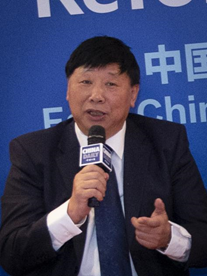
Liu Shijin, deputy director of the Economic Affairs Committee of the Chinese People’s Political Consultative Conference and vice-president of the China Development Research Foundation, said: “As China continues to grow in a consistent and stable manner, undoubtedly it will provide a big and growing market, which creates great opportunities for China-EU collaboration. As China increasingly strives for high-quality growth, China-EU collaboration will also strengthen across all levels, and become more comprehensive and high quality, especially in the development knowledge intensive service sectors, creative industries and the process of industrial capacity upgrade. China’s deepening of structural reform and its further opening-up have created the foundation for the structures and policy of China-EU collaboration. Deeper China-EU collaboration is not only benefiting the development of both parties but also provides the basis for strong, balanced, resilient and sustainable global development.”
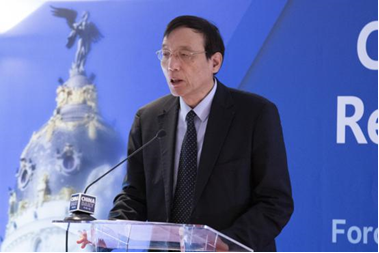
Bernard Dewit, chairman of the Belgian-Chinese Chamber of Commerce and holder of a Chinese Government Friendship Award, said: “Under President Xi Jinping’s leadership, with the 40 years of experience, I believe China could advance three dimensions of reform, namely, sustainable reform, comprehensive reform, and global governance reform.”
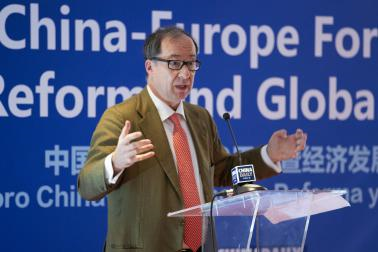
Chi Fulin, president of the China Institute for Reform and Development, said: “China and the EU should join hands to cope with new changes in economic globalization by persisting in free trade and multilateralism as the focus. China’s structural shift to emphasize advanced manufacturing and consumption, and China’s further opening-up, will all provide great opportunities for the EU. To speed up bilateral and multilateral free-trade process will not only create huge potential for China-EU cooperation, it will also bring good news to economic globalization and the world economy.”

Chang Xiangqun, director of the Global China Institute, UK, said: “Two sets of principles drive forward China-UK relations and China-EU relations, and the deepening of reforms. When President Xi Jinping met British Prime Minister Theresa May, he mentioned that China and the UK will upgrade their ‘golden era’ of relations and push forward bilateral relations to a more strategic, practical, globalized, and inclusive level. When meeting European Council President Donald Tusk and European Commission President Jean-Claude Juncker, he said China and the EU should further strengthen their partnerships for peace, growth, reform, and civilization. These two sets of principles are applicable to both set of relationships.”
Dennis Pamlin, senior adviser at the Research Institutes of Sweden, and founder of 21st Century Frontiers, said: “When we look back at the past 40 years, we also find new inspirations. Things we couldn’t dream about 40 years ago – such as talking with each other so easily across continents, or lifting so many people out of poverty, are now possible. So, when we start looking at the next 40 years, we should allow ourselves to think big. It is not just China’s dream, but the world’s dream.”
Chang Xiuze, professor of the Macro Economic Research Institute of the National Development and Reform Commission, said: “China’s door will never be closed. It will only open wider. This brings several important reforms, including the widening of market access, and the provision of a level playing field for all participants. This will facilitate the Chinese economy to push forward marketization, strengthening the rule of law and globalization in a more comprehensive way.”
Panel 2: Sino-Spanish Strategic Relations and Common Prosperity
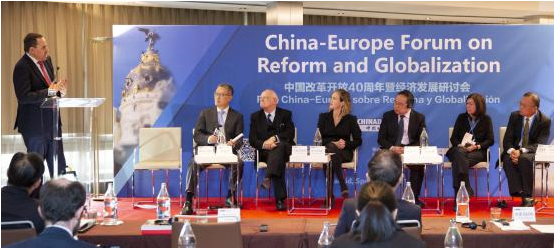
Experts attending panel 2 discussion
He Yafei, former deputy director of the Overseas Chinese Affairs Office of the State Council, said: “The China-EU relationship is relatively stable, without many ups and downs. EU countries have actively participated in the development of the Belt and Road Initiative. China, the EU and Latin American markets have great potential to further strengthen collaboration, this collaboration will not only benefit China and the EU but the world, especially many developing economies.”Caption: He Yafei, former deputy director of the Overseas Chinese Affairs Office of the State Council, gives a keynote speech)Caption: He Yafei, former deputy director of the Overseas Chinese Affairs Office of the State Council, gives a keynote speech)

Eugenio Bregolat, former Spanish ambassador to China, said: “We should further scale up China-Spain collaboration. The Belt and Road Initiative presents tremendous opportunities for Spanish companies to collaborate with Chinese partners in third-country markets in Latin America and Africa. The world needs to foster collaboration and cast aside confrontation. If this trade war continues, the world economy can have another recession and many other economies will suffer.”Caption:Eugenio Bregolat, Spain’s former ambassador to China.)
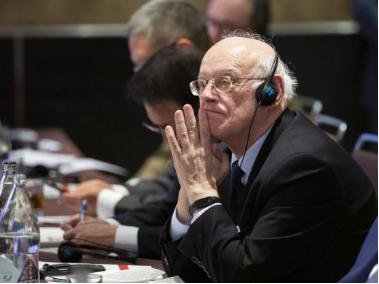
Zhao Jinping, former director of the Research Department of Foreign Economic Relations of the Development Research Centre of State Council, said: “To increase the quantity and quality of China-Spain bilateral investment is very important for strengthening bilateral relations. Both sides should first improve policy encouragement, to provide the investing companies with a good policy environment. The two sides should further open their markets for foreign access, and provide their companies with information, training and financial support to access the other market. Secondly, the two sides should work together to propel China-EU investment collaboration, together uphold multilateralism of trade, together push forward freer investment, and strengthen the EU and other countries’ participation in the Belt and Road Initiative.”
Maria Zarraluqui, vice-president of Meliá Hotels International, said: “The tourism sector can realize many fruitful cooperation between China and Spain. Spain’s tourism is very important for our economy and we are very happy to see many more Chinese tourists visiting Spain in recent years.”
Gladys Nieto, director of Confucius Institute of Madrid, said: “Relationships between Spain and China regarding educative, scientific and cultural areas had a strong push over the last 10 years. There were many agreements signed that eased the opening of institutions that promoted language and culture in both sides, such as Cervantes Institute in Beijing, Cervantes Library in Shanghai, Chinese Cultural Center in Madrid, and the eight Confucius institutes in the Spanish soil.”
Zhang Haiyan, director of Neoma Confucius Business Institute for Business in France, said: “After the financial crisis, the EU has welcomed Chinese companies to invest. However, in recent years, both the EU and the US have increased their frameworks to clear foreign investments. In many industries, China has already gained a world leading position. Let’s hope that the EU will continue to tread a path of multilateralism and win-win partnership.”
Marcelo Muñoz, president of the Catedra China; founder of the first Spanish business in China, said: “We need a strong alliance between China and the EU, well beyond the existing one. China and the European Union, in my humble opinion, represent the ethical values that can be the basis of global governance, which can fight against economic and gender inequality, and contribute to the Millennium Development Goals.”
Andrea Rizzi, chief editor, International Affairs, El Pais, said: “Spain has opportunities to build a harmonic and mutually beneficial relationship with China, especially in politics, economy, cultural areas and the two countries are well suited to collaboration in Latin American counties.”
Angel Pascual-Ramsay, director of Global Risks at ESADEgeo-Center for Global Economy and Geopolitics, said: “Spain can be a good ally for China, our histories have a lot of similarities, we both understand the need to balance economic growth with social stabilities, and economically we are very open to Chinese investment.”
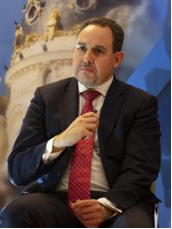
Angel Pascual-Ramsay, director of Global Risks at ESADEgeo-Center for Global Economy and Geopolitics, moderates discussions of the forum’s second panel.
Panel 3: G20 Cooperation and Globalization Process
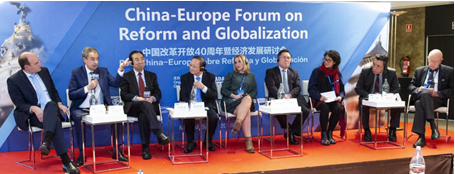
Experts attending a panel discussion.
Wu Hailong, president of the Chinese People’s Institute of Foreign Affairs, said: “China is a beneficiary of globalization, as well as a participant and contributor. As China rides on the trend of global economic development, and proactively integrates into the global supply chain, industrial chain and value chain, it has leapfrogged development. Currently, the world stands at crossroads. I hope that at the G20 Global Leaders Summit in Buenos Aires, all parties will be able to work together, to acknowledge disagreements, uphold multilateralism and signal free trade, strengthen economic growth, make progress on global governance and lead globalization into the right direction.”Caption: Wu Hailong, president of the Chinese People’s Institute of Foreign Affairs, gives a keynote speech)

Wu Hailong, president of the Chinese People’s Institute of Foreign Affairs, gives a keynote speech
Wei Jianguo, vice-chairman of the board at the China Center for International Economic Exchanges, said: “The inaugural China International Import Expo was successfully held in Shanghai. Spain’s red wine, olive oil, leather products and ham are all very popular at the expo. In recent years, China-Spain collaboration is growing in a positive direction. Chinese tourists travelling to Spain have grown at an annual rate of 30 percent, and China’s import from Spain has grown at 30 percent, these are all positive signals of Sino-Spanish collaboration At the same time, China’s collaboration with Spain in Asia, Latin America and other third world market has enjoyed fruitful growth.”

Ivona Ladjevac, head of Regional Center “Belt and Road” at the Institute of International Politics and Economics in Belgrade, Serbia, said: “China is important for EU and its tendency is to develop cooperation both in the fields of economy, trade and politics. One of the signals of such tendency is EU-China 2020 Strategic Agenda for Cooperation.”
David Gosset, founder of the Europe-China Forum, said: “In the current situation, China and the EU have a historical duty: to protect multilateralism, to do everything possible to avoid the regression towards unilateralism that, very unfortunately the American President is generating. And, beyond, China and the EU – and Spain is an important force within the EU – have to contribute to the reform of global governance.David Gosset, founder of the Europe-China Forum, moderates discussions of the forum’s third panel)

Jiang Ruiping, vice-president of China Foreign Affairs University, highlighted the importance of the G20 in addressing multilateral issues, said: “The reform of the WTO and the development of the IMF have both increasingly become the important topics of discussion at the G20 Global Leader Summit. We must ride on globalization trends to improve multilateral governance frameworks, create more comprehensive governance structures, and improve the role of the G20 to coordinate collaboration between different global powers, and efficiently drive forward globalization.”
Gu Xuewu, director of the Center for Global Studies at Bonn University, said: “There are huge potentials for Beijing and Brussels to team up to defend a rule-based international order, to reduce the dependency on the US dollar, and to coordinate and harmonize Chinese and European activities in third countries, particularly in Africa and Latin America.”
Yu Shuo, administrator and professor of transcultural anthropology, Campus International pour une Civilisation Écologique, France, said: “To further reform and opening-up, we must take responsibility to create our shared destiny, and view our shared future with an explorative mindset. Every civilization, every country, every culture and every society exhibit a myriad of differences, but within the globalizing world, such diversity builds a solid foundation for our shared governance wisdom.
Andrés Ortega, senior research fellow, Real Instituto Elcano, said: “China’s controlled but ongoing globalization is essential for economic development. The US is pulling back, but not the rest of the world, with the effect being a loss of jobs and salaries. We need to recover multilateral, not unilateral, control on globalization and to make it more inclusive.”
Chen Weihua contributed to this story.





















